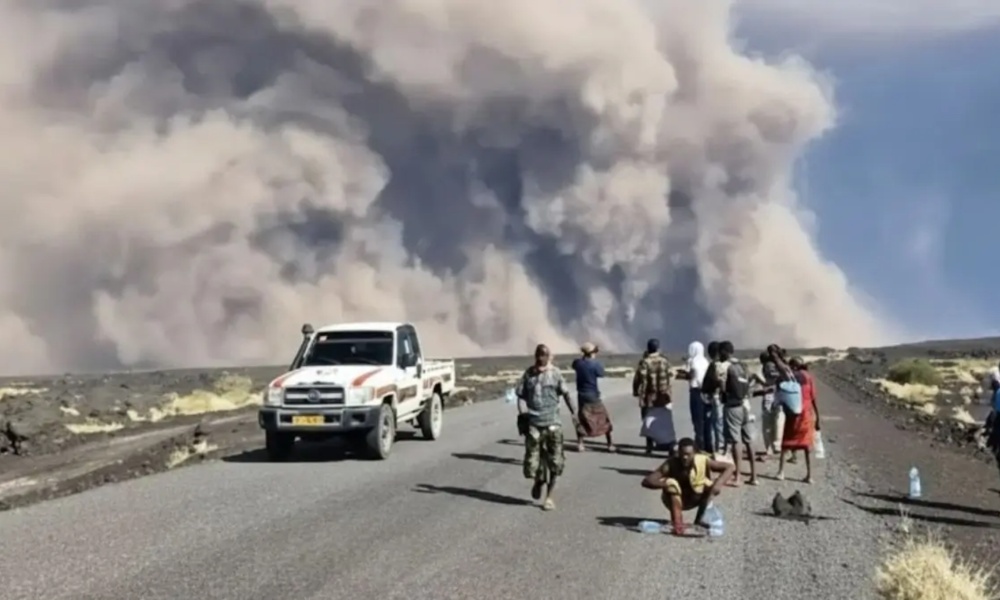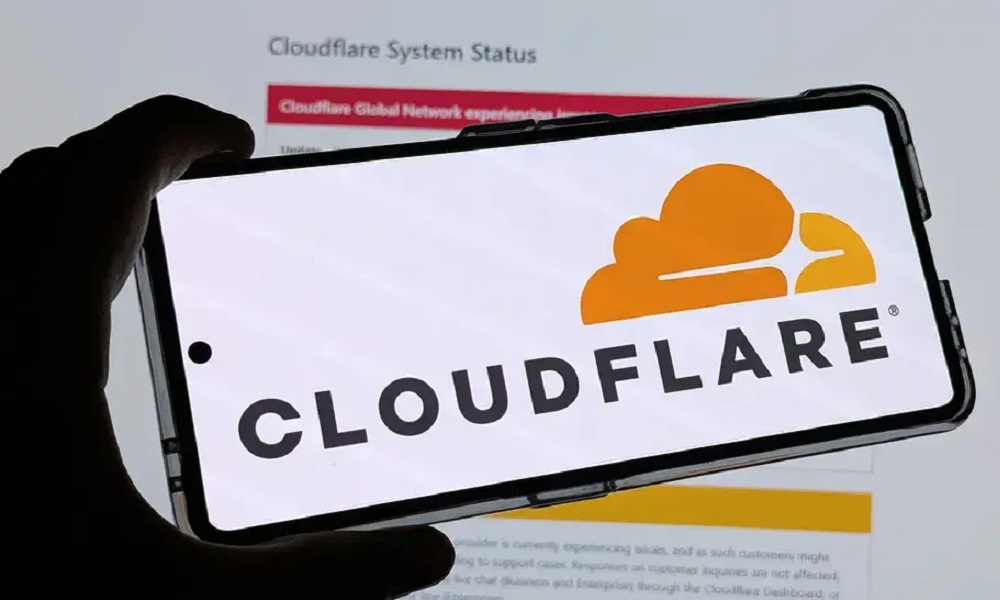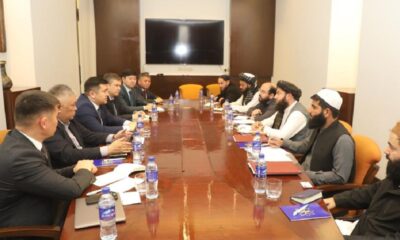Science & Technology
Tesla CEO Elon Musk unveils ‘Cybercab’ robotaxi
Analysts and industry experts said establishing robotaxis could take years, particularly due to ensuring safety and reliability. They pointed to accidents as well as the difficulty the technology has responding to scenarios such as inclement weather, complex intersections and pedestrian behavior.

Tesla CEO Elon Musk showcased on Thursday a long-awaited robotaxi with two gull-wing doors and no steering wheel or pedals and surprised with robovan, betting on a shift in focus from low-priced mass-market cars to robotic vehicles.
At a glitzy unveiling, Musk reached the stage in a “Cybercab” to be produced from 2026 – eventually in high volume – and priced under $30,000. He then introduced the robovan which can carry up to 20 people though offered few further details, Reuters reported.
But Musk, who has a record of missing projections – and himself said he tended to be optimistic with time frames – did not say how quickly Tesla could ramp up robotaxi production, clear inevitable regulatory hurdles or implement a business plan to leapfrog robotaxi rivals such as Alphabet’s Waymo.
Analysts and industry experts said establishing robotaxis could take years, particularly due to ensuring safety and reliability. They pointed to accidents as well as the difficulty the technology has responding to scenarios such as inclement weather, complex intersections and pedestrian behavior.
But Musk, wearing a leather-jacket and addressing crowds at the Warner Bros studio near Los Angeles, said autonomous cars could be 10 times safer than humans and drive five to 10 times longer.
“The autonomous future is here,” Musk said. “With autonomy, you get your time back.”
Musk had previously said he planned to operate a fleet of self-driving Tesla taxis that passengers can hail through an app. Individual Tesla owners would also be able to make money on the app by listing their vehicles as robotaxis, he had said. He made no mention of the app at Thursday’s event.
The event – titled “We, Robot” in an apparent nod to the “I, Robot” science-fiction short stories by American writer Isaac Asimov – echoed Musk’s comment that Tesla “should be thought of as an AI robotics company” rather than an automaker.
It started after a delay of nearly an hour which Musk attributed to a medical emergency involving an attendee. The presentation, months in the making, lasted for less than half an hour and was watched by about four million people on Musk’s X social media platform alone.
“I’m a shareholder and pretty disappointed. I think the market wanted more definitive time lines,” said equity trader Dennis Dick at Triple D Trading. “I don’t think he said much about anything.”
Running the Cybercab will cost 20 cents a mile over time and charging will be inductive, requiring no plugs, Musk said. Operating the robovans will be even cheaper – at 5 cents a mile.
The vehicles will rely on artificial intelligence and cameras rather than hardware common among robotaxi rivals, he said, such as lidar – an approach experts have flagged as challenging both from a technical and regulatory stand point.
Beyond vehicles, Musk touted “a lot of progress” made with its humanoid robot “Optimus” that could eventually be priced at $20,000 to $30,000 and which can perform many daily tasks.
TOUGH TO CRACK
Musk said in 2019 he was “very confident” Tesla would have operational robotaxis by 2020. This year, he diverted focus to the Cybercab and scrapped plans to build a smaller, cheaper car widely seen as essential to countering slowing EV demand.
Tesla is at risk of posting its first-ever decline in deliveries this year as buying incentives have failed to attract enough customers to its aging EV lineup, showed Reuters calculations based on third-quarter earnings. Price cuts meant to offset high interest rates have also squeezed profit margins.
Several companies attempting to crack the robotaxi market have suffered billion of dollars in loss, forcing some to shut shop.
Alphabet’s Waymo, with about 700 Jaguar Land Rover cars in its fleet, is the only U.S. firm operating uncrewed robotaxis that collect fares.
Amazon’s Zoox is testing purpose-built vehicles that resemble toaster ovens on wheels and lack manual controls. General Motors’ Cruise, which uses the Chevrolet Bolt EV, this year indefinitely suspended plans to develop its self-driving “Origin” without controls.
Tesla’s approach to full self-driving technology, in its current iteration, requires constant driver attention but keep costs down. It has, however, faced legal scrutiny with at least two fatal accidents involving the technology.
“We do expect to start fully autonomous unsupervised FSD in Texas and California next year.” Musk said. “That’s with the Model 3 and Model Y.”
He did not say whether the Cybercab uses FSD or new technology.
“Musk did a fantastic job of painting an ideal future for transportation that promises to both free up our time and increase safety,” said Jessica Caldwell, head of at car research and buying website Edmunds. “But many questions remain about how this will be achieved from a practical standpoint.”
Science & Technology
Australia social media ban set to take effect, sparking a global crackdown
For the social media businesses, the implementation marks a new era of structural stagnation as user numbers flatline and time spent on platforms shrinks, studies show.

Australia is set to become the first country to implement a minimum age for social media use on Wednesday, with platforms like Instagram, TikTok and YouTube forced to block more than a million accounts, marking the beginning of an expected global wave of regulation.
From midnight, 10 of the biggest platforms will be required to block Australians aged under 16 or be fined up to A$49.5 million ($33 million), Reuters reported.
The law received harsh criticism from major technology companies and free speech advocates, but was praised by parents and child advocates.
The rollout closes out a year of speculation about whether a country can block children from using technology that is built into modern life. And it begins a live experiment that will be studied globally by lawmakers who want to intervene directly because they are frustrated by what they say is a tech industry that has been too slow to implement effective harm-minimisation efforts.
Governments from Denmark to Malaysia – and even some states in the U.S., where platforms are rolling back trust and safety features – say they plan similar steps, four years after a leak of internal Meta (META.O) documents showed the company knew its products contributed to body image problems and suicidal thoughts among teenagers while publicly denying the link existed.
“While Australia is the first to adopt such restrictions, it is unlikely to be the last,” said Tama Leaver, a professor of internet studies at Curtin University.
“Governments around the world are watching how the power of Big Tech was successfully taken on. The social media ban in Australia … is very much the canary in the coal mine.”
A spokesperson for the British government, which in July began forcing websites hosting pornographic content to block under-18 users, said it was “closely monitoring Australia’s approach to age restrictions.”
“When it comes to children’s safety, nothing is off the table,” they added.
Few will scrutinise the impact as closely as the Australians. The eSafety Commissioner, an Australian regulator tasked with enforcing the ban, hired Stanford University and 11 academics to analyse data on thousands of young Australians covered by the ban for at least two years.
Though the ban covers 10 platforms initially, including Alphabet’s (GOOGL.O), YouTube, Meta’s Instagram and TikTok, the government has said the list will change as new products appear and young users switch to alternatives.
Of the initial 10, all but Elon Musk’s X have said they will comply using age inference – guessing a person’s age from their online activity – or age estimation, which is usually based on a selfie. They might also check with uploaded identification documents or linked bank account details.
Musk has said the ban “seems like a backdoor way to control access to the internet by all Australians” and most platforms have complained that it violates people’s right to free speech.
For the social media businesses, the implementation marks a new era of structural stagnation as user numbers flatline and time spent on platforms shrinks, studies show.
Platforms say they don’t make much money showing advertisements to under-16s, but they add that the ban interrupts a pipeline of future users. Just before the ban took effect, 86% of Australians aged 8 to 15 used social media, the government said.
“The days of social media being seen as a platform for unbridled self-expression, I think, are coming to an end,” said Terry Flew, the co-director of University of Sydney’s Centre for AI, Trust and Governance.
Platforms responded to negative headlines and regulatory threats with measures like a minimum age of 13 and extra privacy features for teenagers, but “if that had been the structure of social media in the boom period, I don’t think we’d be having this debate,” he added.
Science & Technology
Ethiopian volcano erupts for first time in nearly 12,000 years
Ash from the eruption drifted across the region, spreading over Yemen, Oman, India, and parts of Pakistan.

The Hayli Gubbi volcano in Ethiopia’s Afar region has erupted for the first time in almost 12,000 years, sending massive ash plumes soaring up to 14 kilometres into the atmosphere, according to the Toulouse Volcanic Ash Advisory Centre.
The eruption began on Sunday and lasted several hours. Hayli Gubbi, located around 800 kilometres northeast of Addis Ababa near the Eritrean border, sits within the geologically active Rift Valley, where two major tectonic plates meet. The volcano rises roughly 500 metres above the surrounding landscape.
Ash from the eruption drifted across the region, spreading over Yemen, Oman, India, and parts of Pakistan. Satellite imagery and social-media videos captured a towering column of white smoke billowing into the sky.
The Smithsonian Institution’s Global Volcanism Program notes that Hayli Gubbi has no recorded eruptions during the Holocene, the period dating back about 12,000 years to the end of the last Ice Age.
Volcanologist Simon Carn of Michigan Technological University also confirmed on Bluesky that the volcano had “no record of Holocene eruptions.”
Science & Technology
Cloudflare outage easing after millions of internet users affected

A global outage at web-infrastructure firm Cloudflare began to ease on Tuesday afternoon after preventing people from accessing major internet platforms, including X and ChatGPT.
Cloudflare, whose network handles around a fifth of web traffic, said it started to investigate the internal service degradation around 6:40 a.m. ET. It has deployed a fix but some customers might still be impacted as it recovers service.
The incident marked the latest hit to major online services. An outage of Amazon’s cloud service last month caused global turmoil as thousands of popular websites and apps, including Snapchat, were inaccessible due to the disruption.
Cloudflare – whose shares were down about 5% in premarket trading – runs one of the world’s largest networks that helps websites and apps load faster and stay online by protecting them from traffic surges and cyberattacks.
The latest outage prevented users from accessing platforms such as Canva, X, and ChatGPT, prompting users to log outage reports with Downdetector.
Downdetector tracks outages by collating status reports from a number of sources. “We saw a spike in unusual traffic to one of Cloudflare’s services beginning at 11:20 UTC. That caused some traffic passing through Cloudflare’s network to experience errors,” the company said in an emailed statement.
“We are all hands on deck to make sure all traffic is served without errors.”
X and ChatGPT-creator OpenAI did not immediately respond to requests for comment. – REUTERS
-

 Latest News2 days ago
Latest News2 days agoAfghanistan signs 30-year deal for marble mining in Daikundi
-

 Latest News4 days ago
Latest News4 days agoAfghan border forces prevent illegal entry of hundreds into Iran
-

 Latest News3 days ago
Latest News3 days agoPakistan summons Afghan diplomat over deadly attack in North Waziristan
-

 Latest News2 days ago
Latest News2 days agoAfghan health minister calls for medical cooperation between Kabul and New Delhi
-

 Latest News4 days ago
Latest News4 days agoJapan allocates nearly $20 million in humanitarian aid for Afghanistan
-

 Latest News3 days ago
Latest News3 days agoKarzai urges reopening of girls’ schools and universities for Afghanistan’s bright future
-

 Health5 days ago
Health5 days agoAfghanistan seeks India’s support in standardizing traditional medicine
-

 Business5 days ago
Business5 days agoAfghanistan-Kazakhstan banking ties discussed in Kabul meeting
























